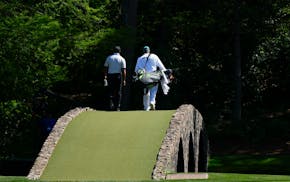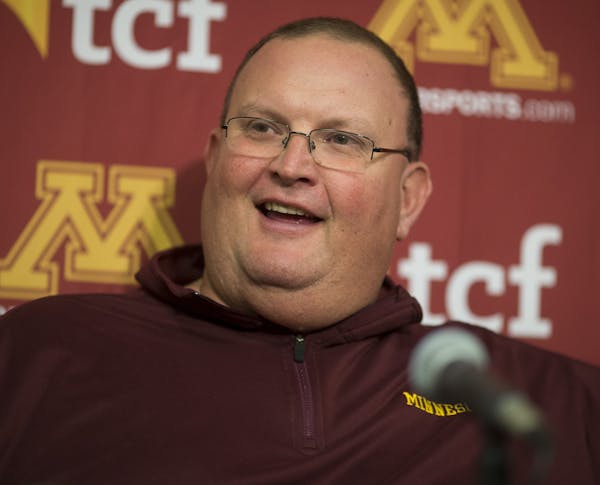If you're the kind of Gophers fan who thinks University of Minnesota sports teams are unfairly attacked, you should revisit the '70s thriller "When a Stranger Calls," which features one of the most famous lines in movie history.
The calls are coming from inside the house.
Jerry Kill's health might have prevented him from continuing as Gophers football coach under any circumstances. What several prominent boosters I've spoken with believe is that his health woes were exacerbated by the continuing mismanagement of athletics at the university, the core reason Minnesota football and basketball have struggled for decades to succeed.
Kill is a workaholic. Not all head football coaches are. Some delegate, some believe in working livable hours. Steve Spurrier probably spent more time on golf courses than in meeting rooms.
Kill tried to do it all as the head football coach at a program that required a workaholic's attention. Because the Gophers haven't had a powerhouse athletic director for some time and are operating without a permanent AD right now, Kill also took on the duties of fundraising and fighting administrative battles on behalf of his program. He took on tasks that Jim Harbaugh and Urban Meyer might not know exist.
As he said during his heartbreaking news conference Wednesday, Kill felt he couldn't take his medications and do the work required by his multifaceted position. There are key people who believe the University of Minnesota was not good for his health.
Because I wrote with a tone I regret about Kill's seizure on the sideline in 2013, I have been painted as callous. I have apologized to him and his wife in person, as well as apologizing in print and online.
While vocal Gophers fans used my column to bolster their belief that Gophers sports are unfairly under fire from outsiders, the reality is that the calls are coming from inside the house.
I know high-level Gophers boosters. I know many more Gophers alums who are successful and would be bigger boosters if they ever saw signs of intelligent life inside the athletic department.
Even before Kill retired, the alums I know spent this fall asking whether they would ever in their lifetimes see sustained football success at their university. Kill was beloved not because he elevated the Gophers to national prominence, but because he enjoyed moderate success where little is expected.
There is no mystery as to why the Gophers have struggled to succeed in their major sports. Let's review their most important hires of late:
• Former AD Joel Maturi failed to land anybody on his A list during the last coaching search. He was lucky to find a competent coach on his B-list. In college football circles it is well known that Bo Pelini, after interviewing at Minnesota following Glen Mason's firing, called his buddies to tell them he wouldn't even consider working for that administration.
• Before he hired Kill, Maturi hired Tim Brewster, who hadn't run a team, an offense or a defense at a level higher than high school. In college football circles, that hire was a punchline. Brewster was a disaster.
• Minnesota hired Norwood Teague to replace Maturi. He was a disaster.
• Teague hired basketball coach Richard Pitino as an unproven long shot because he couldn't land anybody on his A-list.
• The administration has not hired a permanent replacement for Teague and likely won't until two investigations are complete: a federal Title IX probe and an external review of sexual harassment claims involving Teague.
Kill earned the admiration and affection of those he worked with, and of the fan base. He also went 14-21 in the Big Ten and 0-3 in bowl games, and was heading toward a series of games that could have made this one of the most disappointing seasons in the program's frequently disappointing history.
There is something wrong at the University of Minnesota. Kill's daily fight to transcend institutional lethargy could not have been good for his health.
Jim Souhan's podcast can be heard at MalePatternPodcasts.com. On Twitter: @SouhanStrib. jsouhan@startribune.com

Souhan: This is KAT's chance to prove Flip Saunders was right

Souhan: Why Tiger Woods should keep swinging
Souhan: Scheffler wins Masters again, shows what makes him special
Morikawa falters in final round at Masters


